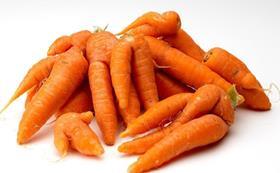
Fruit and vegetable marketing standards implemented last year to cut red-tape and increase options during the economic downturn will remain, it has been revealed, after an attempt to reinstate the original standards failed this week.
A group of European Members of Parliament (MEPs) tabled a motion that would have seen the return of a ban on misshapen and discoloured fresh produce.
However, the proposal was defeated in the European Parliament, with opponents to the move claiming that it would lead to unnecessary food wastage.
'Finally we can put the nonsensical wonky fruit ban to bed,' said Alyn Smith, MEP for the UK-based Scottish National Party, in a statement. 'This issue should never have come back to life after the (European) Commission removed the restrictions last year, and I sincerely hope we won't see another resurrection any time soon
A ruling scrapping existing European Union marketing standards on arange of fresh fruit and vegetables came into force on 1 July 2009, signalling the return of misshapen produce to supermarketshelves.
The move, which impacted 26 different types of fresh produce, waspart of a European Commission plan to simplify regulations and cut red tape.
The revised standards applied toapricots, artichokes, asparagus, aubergines, avocados, beans, brusselsprouts, carrots, cauliflowers, cherries, courgettes, cucumbers,cultivated mushrooms, garlic, hazelnuts in shell, headed cabbage,leeks, melons, onions, peas, plums, ribbed celery, spinach, walnuts inshell, watermelons and chicory.
However, existing standards remained in place for apples, citrus fruit,kiwifruit, lettuce, peaches, nectarines, pears, strawberries, sweetpeppers, table grapes and tomatoes – although these products can beexempted if they are sold with a label clearly distinguishing them from'extra', 'class I' and 'class II' fruit.
Meanwhile, an amendment on mandatory country of origin labelling laid out by the Committee on Agriculture and Rural Development has been approved by the European Parliament.
The move is intended to add value to the economies of Europe's regions, safeguard food quality and give consumers valuable information while boosting farmers' competitiveness, Parliament said.
Responding to a Commission consultation paper on EU food quality policy, the resolution forms part of a wider debate in Parliament on the future aims of the Common Agricultural Policy.
And the need to keep the current system of geographical indications (GIs), and in particular its two main tools – protected designation of origin (PDO) and protected geographical indication (PGI) – was emphasised by members.
MEP Paolo De Castro, a former Italian Minister of Agriculture, welcomed the decision to maintain the current system of EU geographical indications – a key plank of the Agriculture Committee's draft resolution.
'We hope that the approval of this report marks the definitive consecration of quality as a cornerstone of Europe's strategy for the agri-food sector and that the Commission give serious consideration to this committee's proposals, so one of the main strengths of European agriculture will be transformed into a valuable competitive advantage,' he said.
German MEP Elisabeth Köstinger noted that checks and objective criteria were required in order to maintain high quality standards.
'The fact is, though, that for consumers economic considerations also come into play,' said Ms Kostinger. 'Quality has its price, and the farmers need a fair income, but the consumer has the freedom to resort to a cheap product, even though that often means
opting for a lower-quality product.
'So, we need to increase general awareness among consumers; we need protected geographical indications and designations of origin; we need to introduce a new regulated and protected designation for products from mountain regions and GM-free zones; and we also need to offer information on guaranteed traditional specialities and organic farming. These must be preserved at all costs,' she added.



